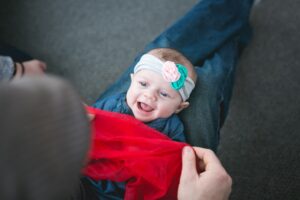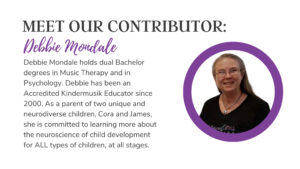Tag: musical bonding activities
Newborn Sensory Play: Exploring Scarf Play with Music
 Scarf play with music for a newborn? OH YES! Discover the magic of scarf play with music for your newborn and how it can engage their senses and promote development.
Scarf play with music for a newborn? OH YES! Discover the magic of scarf play with music for your newborn and how it can engage their senses and promote development.
Multi-Sensory Stimulation:
As your baby feels, touches and sees the scarf moving, and hears the music match the movements, so many of their senses are sending messages to the brain all at the same time. In turn, your baby’s brain is absorbing and integrating this sensory information, building neural connections that can become automated awareness, leaves their brain energy for new things to learn.
Interactive Play for Development:
Because infants rely on interactive play with a loving family member to stimulate them, calm them, and enable them feel joy… all which are key to optimal infant development, scarves offer a gentle way to accent your play and spark creativity.
Incorporating Scarf Play in Family Time:
Mommy and me music playtime with a scarf can provide all of that… moving the scarf along with vocal play, describing words, upbeat tunes or sweet lullabies. Daddy and me activities can be a bit more robust, holding baby up to their chest facing out, and marching through the room with a scarf hanging over their legs… swishing on their skin with the movement. Siblings can lay down in front of Baby, facing them for some delightful infant tummy time playing peek-a-boo, or bouncing the scarf to the beat of rhymes they chant. Scarves are actually a wonderful prop for infant play with your whole family seated in a circle around them tossing the scarf to each other and peeking out at baby in turn.
Understanding Your Baby’s Sensory Sensitivity:
Be aware, each baby has their own sensory sensitivity. Now is a good time to carefully watch to see what your baby is communication to you and adjust accordingly. When your baby seems to avoid or whimper during scarf play, you may need to slow down, start with just visual play or only gently touch extremities. Often young babies can become averse to scarf play when it is immediately used on their face and it may freak them out since they don’t understand it. Any peekaboo play should start with your own face, and they will love it. Once your baby knows what to expect, and enjoys this multi-sensory play, they may be eager for more close to the face movement and robust movements.
Enhancing Scarf Playtime:
Try this: Start with vocalizing on “aah” or “ooh” going higher or lower in pitch MATCHING the movements of the scarf above them as they are laying on the floor. (They love your voice, even if you don’t.) You may include describing words to add the benefit of language development. Use directional words such as up-down, around, over-under, in-out, or action words like swoop, swish, swirl, hop, jump, etc.
Add a personal touch by singing your baby’s name. As you slowly move the scarf upward, focus on the first vowel in their name as the pitch in your voice slowly climbs higher before finishing their name in a playful way. Enjoy the same going lower until the scarf rests on their belly. If they reach for it, let them bat it around and maybe even grab it and pull it in toward the center of their body.
Enhance your play by playing some instrumental music and move the scarf along with the flow of pitch, with small movements for quiet music and bigger movements for louder music.
Benefits of Scarf Play:
As a tiny infant, your baby may not be moving their head side to side yet, so seeing the bright blurry scarf flow above them, and hearing the pitch of your voice sync with the scarf movement is an incredible learning experience. As your baby starts to move their head side to side, they are eager to practice and develop their independent eye tracking to watch the scarf glide across their vision.
As your baby reaches for the scarf, they are practicing their ability to extend their extremities, and as they grab at it and pull it in, they are practicing their ability to flex and hold, critical gross motor skills for infants. Stephanie Johnson, in her book “Baby Bare” calls the first three months of a baby’s life the “Squishies” stage, and these specific visual and motor skills are the first most important aspects of their critical early development.
Before babies can try to imitate anything, their brain is programmed to learn quite complex concepts from their experiences. Babies’ brains are primed to create neural pathways for intervals and math through the more rich classical and jazz music. Simply listening is a delightful background for their daily experiences, but interactive play while listening is when the real learning occurs. Once a child begins to try to imitate, we adapt it for their singing range and capabilities.
Choosing the Right Music:
The barbershop quartet version of “Home Sweet Home” on the free Kindermusik APP (available for any mobile device) is found in the Theme: Relaxation, and has a wonderful high and low flow, perfect for scarf play. For a delightful song with verbal directions, enjoy “Up, Up in the Sky” with your little bird. Download the APP today for music YOU will love to listen to repeatedly as well.
Next Step….Kindermusik!
For an ongoing supply of new ideas and music you can use together with your baby, join us anytime during your infant’s first three months with our special Newborn Offer. If your baby is older, sign up today to Preview a Class and see the musical magic in action with other families with newborn infants, and babies up to walking.
View this post on Instagram
We hope this inspires you to embrace scarf play with music as a valuable tool for newborn sensory development, fostering a strong bond and providing enriching experiences for your baby.
With Music and Magic,
Team Grow and Sing Studios
